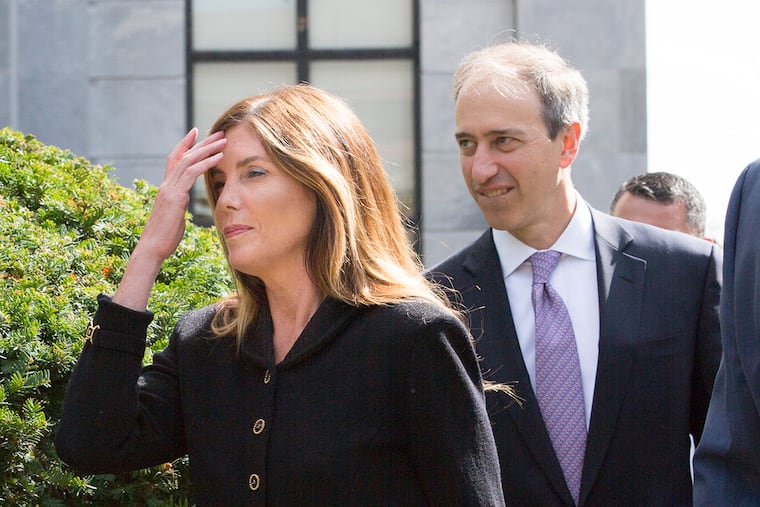Jury deliberating Kane's fate after closing arguments
Prosecutors told jurors Monday that damning testimony against Attorney General Kathleen Kane by her coconspirators was backed up by phone records, emails, texts and a FBI wiretap, while a lawyer for Kane attacked her accusers as liars "who will say whatever they need to protect themselves."

Prosecutors told jurors Monday that damning testimony against Attorney General Kathleen Kane by her coconspirators was backed up by phone records, emails, texts and a FBI wiretap, while a lawyer for Kane attacked her accusers as liars "who will say whatever they need to protect themselves."
The jury of six men and six women began deliberating Kane's fate Monday afternoon on two felony charges of perjury and 10 misdemeanors that essentially charge her with abusing the powers of her office to plant a newspaper story to embarrass a critic.
About an hour after they began deliberating, jurors came back to the courtroom to ask Judge Wendy Demchick Alloy for certain exhibits from the trial. They also wanted the judge to redefine for them the elements of certain crimes Kane is accused of, including official oppression and conspiracy; and wanted copies of specific statements Kane made to the grand jury that prosecutors allege were lies.
Around 7:30, jurors received dinner, a sign that they planned to continue deliberating into the evening.
>>Update: Kane found guilty on all charges
After four days of testimony last week, Montgomery County District Attorney Kevin R. Steele said in his closing argument that Kane had acted out of revenge against a former state prosecutor in illegally leaking secret investigative material -- and that she had essentially admitted her wrongdoing in testimony before a grand jury.
Kane has argued that she did not select the documents leaked to a reporter, but Steele said it was enough that the attorney general had acknowledged a general desire to make public information about a 2009 investigation.
"When she agrees on what she did in terms of getting investigative information out . . . makes her guilty of a crime," Steele said.
He added: "Don't forget how simple this case is."
Kane, 50, sat quietly during Steele's closing, her eyes focused mostly on the members of the jury.
In closing arguments for the defense, Kane lawyer Seth Farber said that Kane's former first deputy, Adrian King, and political consultant Joshua Morrow -- former Kane confidants who were involved in the leak but testified against her as key prosecution witnesses -- contradicted each other.
"You would not even buy a used car from either one of them," Farber said in his closing arguments.
Farber suggested that King and Morrow conspired to leak the documents, and are now blaming Kane to protect themselves.
King, Morrow and other current and former aides to Kane testified last week about her alleged vendetta against former prosecutor Frank Fina, and prosecutors say her illegal leak was an act of revenge against him.
But Farber said Morrow wanted revenge on Fina even more than Kane did, referencing a series of text messages between Kane and Morrow that were displayed at trial.
"While Ms. Kane is clearly no fan of Frank Fina, she was not the one who was obsessed with him," Farber said.
Steele told jurors that several witnesses testified about Kane's anger toward Fina, especially after the Inquirer revealed in March 2014 that Kane had shut down an undercover sting investigation led by Fina.
The newpaper's story disclosed that Kane had ended the case without bringing charges even though several Philadelphia officials had been caught on tape pocketing cash. (Philadelphia District Attorney Seth Williams later resurrected the cases, and so far, his office has won guilty or no-contest pleas from five defendants.)
Witnesses said Kane blamed Fina for the Inquirer story on the shuttered probe.
Kane then planted a story in the Philadephia Daily News to strike back at Fina, Steele said. The June 2014 Daily News story, citing confidential grand jury documents, provided details about a 2009 investigation of Philadelphia civil rights leader J. Whyatt Mondesire.
Steele said Kane was heedless about leaking material that damaged Mondesire and his reputation.
"Mr. Mondesire was never arrested," Steele said. "He was never arrested. But she put it out and that is not permitted under the law."
He also said the documents were given to the Daily News in a "cloak and dagger" fashion and followed by a cover-up because the attorney general knew that her actions were illegal.
Morrow, who testified under the protection of immunity from prosecution, said at trial that he had leaked the documents at Kane's request. He said he had continued lying and changing his story to protect Kane - until days before trial, when he said he told prosecutors the complete story and provided phone records and text messages that corroborated his account.
King testified that he had taken the documents from Kane and left them at his house for Morrow to pick up. He maintained that he never knew what was in them -- a point that contradicts Morrow's testimony that King had described the contents of the package.
While Farber said those inconsistencies undermine their credibility as witnesses, Steele asked the jury to focus only on Kane's alleged crimes.